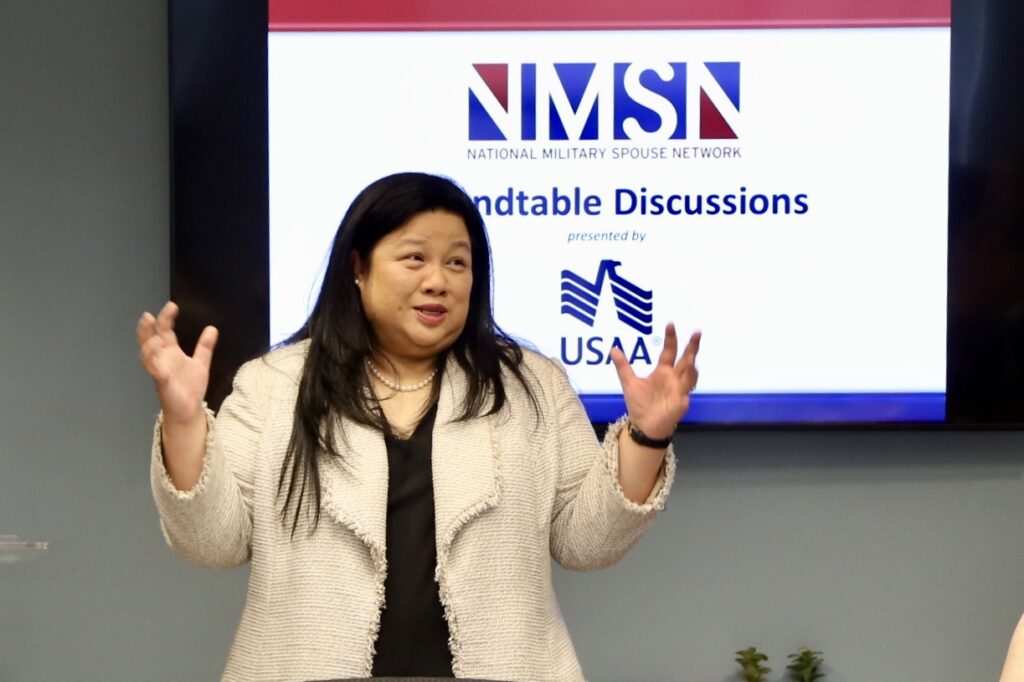The military’s annual budget set by the 2022 National Defense Authorization Act (NDAA) includes a provision to study military spouse employment for the first time in 18 years. The provision was included in part by efforts of the National Military Spouse Network (NMSN), who worked with a bipartisan group of lawmakers, including Sen. Raphael Warnock (D-GA) Sen. Marsha Blackburn (R-TN).
In an interview with American Military News, NMSN founder and president Sue Hoppin said the study would look at what programs the military offers to support military spouse employment and look at which of those programs work and which could be improved.
Hoppin said getting the study included in the 2022 NDAA is a success for NMSN in its own right, because the issue of military spouse employment is one that lacks data, and having that information can help her network find better ways to help military spouses.
The last U.S. government report on military spouse employment of this nature was completed in 2004.
“That was way before the advent of and the uptick in telework, way before military spouses started recognizing that entrepreneurship and small business ownership was a viable option for them,” Hoppin said. “. . . It’s not really an accurate snapshot of the current force.”

Hoppin said this new study will look for trends affecting military spouse employment. “We don’t come into this with ‘these are the results we want.’ We’re just hoping that we get more visibility into the actual experience of a military spouse. Are there any common issues? Are they experiencing discrimination? Are they accessing the resources that are available? Are different spouses experiencing more difficulty because of a service branch, because of the service member’s rank, because of their geographic location? We hope that these are some of the issues that are addressed.”
Hoppin herself was the wife of a U.S. Air Force officer who is now retired after 22 years of service. During that time, she struggled with her own employment.
“No one wanted to hire me,” she said. “Because there was still this stigma that ‘you’re going to move’ and ‘we don’t want to take a chance on you and train you and then you leave us.’ It’s a little bit different now but back then that was the stigma that existed.”

Hoppin started NMSN in 2010 as a network to help military spouses find job opportunities. While the NMSN started mainly as a social group to help military spouses find work, Hoppin said she began to notice trends in the issues affecting her network and NMSN began authoring reports with actionable recommendations for improving employment opportunities. One recommendation was for a study, like the kind included in the 2022 NDAA, to get more information as to what barriers cause spouses to remain unemployed or underemployed for their qualifications, and what programs are serving their employment needs.
Hoppin said any data that the study can provide “to where we can start to look at patterns” would be helpful. Hoppin said NMSN might see some trends in the issue of military spouse employment but “we can only say that anecdotally.”
Hoppin said the new study will also gather baseline information about what resources the military provides for military spouse employment and measure the efficacy of those programs.
Once the study is complete, Hoppin said NMSN’s next steps will be to look at policies and programs the study finds that can be improved and track whether policy changes eventually do align with the findings in the study. Hoppin said NMSN will continue engaging with lawmakers to provide feedback on how to improve employment opportunities for military spouses.

“We ask military families and military spouses to serve and sacrifice in ways most Americans cannot see or understand, and we owe each of our service members and their families the opportunity to thrive as they serve,” Warnock said. “I am proud we have successfully included in this year’s National Defense Authorization Act a provision that will ensure we have the data needed to better understand the challenges facing military spouses who face unacceptable rates of both un- and underemployment. We need to be able to see who they are, where they are, and what specifically is keeping them from finding the opportunities they are seeking.”
Warnock said NMSN’s efforts to push for this study over the past several years “was critical to this year’s success.”
“The National Defense Authorization Act makes it easier for these families to transfer professional licenses across state lines and provides support for them to put food on the table,” Blackburn said. “This work is a small portion of what our service members deserve, and I look forward to continuing these bipartisan efforts for Tennesseans.”
Hoppin said the issue of military spouse employment is one of national security because military families often sustain themselves on incomes from both spouses and when military spouses are able to find employment, it takes away a driving force behind many service members choosing to leave the military. “You literally remove the barriers to them ever having to choose between what’s best for their country and what’s best for their family.”



